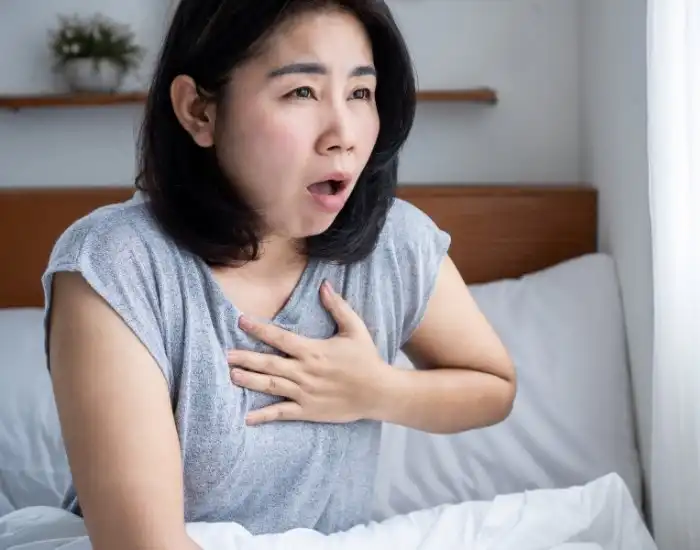Anxiety can affect both your mind and body, often presenting with physical symptoms that can be alarming. Among the most common physical signs of anxiety are shortness of breath and chest discomfort, which can leave you feeling overwhelmed or even fearful. If you’ve experienced these symptoms, you’re not alone. However, it’s essential to understand their connection to anxiety, how to manage them, and when to seek medical attention.
In this blog, we’ll explore the relationship between anxiety, shortness of breath, and chest discomfort, offer tips for managing these symptoms, and discuss when it’s important to consult a healthcare professional.
The Link Between Anxiety and Physical Symptoms
Anxiety is more than just a mental experience—it can trigger a cascade of physical reactions in the body. When you feel anxious, your body enters a “fight or flight” response, releasing stress hormones like adrenaline. These hormones can cause various physical symptoms, including increased heart rate, shallow breathing, and muscle tension. In some cases, this heightened state can lead to shortness of breath and chest discomfort, which may feel similar to more serious conditions like a heart attack or asthma.
Shortness of Breath: When you’re anxious, your body may respond by increasing your heart rate and causing rapid, shallow breathing, which can make you feel as though you’re not getting enough air. This sensation can be unsettling and may lead to further anxiety, exacerbating the feeling of breathlessness.
Chest Discomfort: Anxiety can also cause tightness or a sensation of pressure in the chest. This discomfort is typically due to muscle tension in the chest and ribcage, or it may be caused by hyperventilation (breathing too quickly). While it may feel like heart pain, anxiety-induced chest discomfort is usually not associated with any underlying heart condition.
How to Manage Shortness of Breath and Chest Discomfort
While these symptoms can be frightening, there are several effective ways to manage shortness of breath and chest discomfort caused by anxiety.
- Deep Breathing Exercises: One of the most effective ways to counteract anxiety-related shortness of breath is by practicing deep breathing techniques. Try inhaling slowly through your nose for a count of four, holding your breath for four counts, and then exhaling slowly through your mouth for four counts. This helps calm the nervous system and promotes slower, deeper breathing, reducing the sensation of breathlessness.
- Mindfulness and Relaxation Techniques: Mindfulness practices, such as meditation or progressive muscle relaxation, can help reduce anxiety and ease physical symptoms. Focusing on the present moment can prevent your thoughts from spiraling, which can make the physical symptoms feel more intense. Apps or guided videos can be a helpful resource to get started with these techniques.
- Exercise and Physical Activity: Regular physical activity is beneficial for managing anxiety. When you exercise, your body releases endorphins, which are natural mood enhancers that can reduce anxiety and stress. Light exercises, such as walking or yoga, can also help improve breathing patterns and reduce muscle tension that contributes to chest discomfort.
- Avoid Stimulants: Certain substances, like caffeine, nicotine, or energy drinks, can increase anxiety symptoms. If you’re prone to anxiety-induced shortness of breath or chest discomfort, it’s a good idea to limit or avoid these substances.
- Addressing Triggers: Identifying and managing the specific triggers that cause your anxiety can be a powerful way to reduce symptoms. Whether it’s work stress, personal relationships, or health concerns, understanding your triggers allows you to take proactive steps in managing your anxiety.
When to Seek Medical Help
While shortness of breath and chest discomfort are commonly linked to anxiety, there are times when it’s important to seek medical attention. If you experience any of the following, it’s essential to consult a healthcare provider right away:
- Persistent or worsening chest pain
- Difficulty breathing even when at rest
- Dizziness or fainting
- Pain that radiates to your arm, jaw, or back
- Sweating, nausea, or a feeling of impending doom
These could be signs of a serious medical condition, such as a heart attack, and should not be ignored.
Final Thoughts: Managing Anxiety and Its Physical Symptoms
Shortness of breath and chest discomfort caused by anxiety are understandably distressing, but they are manageable. Understanding that these symptoms are linked to anxiety can help you approach them with calm and confidence. By incorporating relaxation techniques, regular physical activity, and stress management strategies, you can reduce the impact of these symptoms on your daily life.
If your symptoms persist or interfere with your ability to function, it’s important to consult with a healthcare professional who can help you develop a personalized treatment plan. At Katy Primary Care, our expert physicians specialize in treating anxiety and its physical effects, offering compassionate care tailored to your individual needs. Schedule an appointment with us today to discuss your symptoms and find a solution that works for you.
Disclaimer:
The information provided in this blog is for educational purposes only and is not intended as medical advice. It should not be used to diagnose or treat any health condition. Always consult with a qualified healthcare professional for accurate diagnosis and treatment of any symptoms or medical concerns.






0 Comments